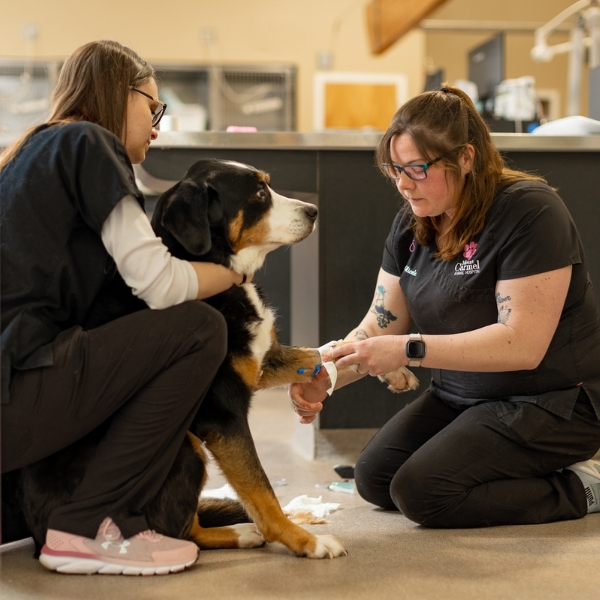Osteoarthritis
Osteoarthritis (OA) is a chronic, degenerative joint disease that affects pets, especially older dogs and cats. It occurs when the cartilage that cushions the joints wears down over time, leading to pain, stiffness, and reduced mobility.
How Osteoarthritis Affects Pets
- Joint Pain & Stiffness – Pets may have difficulty getting up, walking, or climbing stairs.
- Reduced Activity – They may be less playful and reluctant to move.
- Limping or Lameness – More noticeable after rest or exercise.
- Muscle Loss – Due to decreased movement and weight shifting.
- Irritability or Behavioral Changes – Pets may become grumpy or avoid being touched.
- Difficulty Standing or Lying Down – Pets may struggle to get comfortable.
- Licking or Biting Joints – A sign of pain and discomfort.
Managing Osteoarthritis in Pets
- Pain Relief – Medications like NSAIDs (prescribed by a vet) can reduce pain.
- Weight Management – Keeping a healthy weight reduces stress on joints.
- Joint Supplements – Glucosamine, chondroitin, and omega-3 fatty acids help joint health.
- Physical Therapy & Acupuncture – Improves mobility and reduces pain naturally.
- Gentle Exercise – Swimming and short walks help maintain muscle strength.
- Comfortable Bedding – Soft, orthopedic beds reduce joint pressure.
If your pet is showing signs of osteoarthritis, schedule an office today. One of our veterinarians will evaluate your pet’s condition, discuss goals and treatment options. Our doctor will work with you to develop a treatment plan that meets your pet’s needs.
Treating osteoarthritis (OA) in dogs and cats focuses on pain management, improving mobility, and slowing disease progression. A multimodal approach works best, combining lifestyle changes, medications, and alternative therapies.
Treatment Options for Osteoarthritis in Dogs & Cats
Pain Management & Anti-Inflammatory Medications
- Non-Steroidal Anti-Inflammatory Drugs (NSAIDs) – Reduce pain & inflammation (e.g., Carprofen, Meloxicam for dogs; use cautiously in cats).
- Pain Relievers – Gabapentin (nerve pain), Amantadine, or Tramadol may be used.
- Injectable monoclonal antibodies – help control pain associated with osteoarthritis
- Librela (Librela for Pet Owners | Zoetis Petcare) for dogs
- SolensiaSolensia for Pet Owners | Zoetis Petcare) for cats
- Joint Injections – Platelet-rich plasma (PRP) or stem cell therapy for severe cases.
Joint Supplements & Diet
- Glucosamine & Chondroitin – Help repair joint cartilage & improve mobility.
- Omega-3 Fatty Acids (Fish Oil) – Reduce inflammation and support joint health.
- Hyaluronic Acid – Improves joint lubrication.
- Prescription Joint Diets – Purina JM or Royal Canin Mobility contain joint-supportive nutrients.
Rehabilitation Therapy & Alternative Therapies
- Acupuncture – Reduces pain & improves circulation.
- Laser Therapy (Cold Laser) – Helps decrease inflammation & promote healing.
- Hydrotherapy (Swimming or Underwater Treadmill) – Low-impact exercise to strengthen muscles.
- Massage & Chiropractic Care – Loosens stiff joints & improves movement.
Lifestyle Adjustments & Home Care
- Weight Management – Keeping a healthy weight reduces joint stress.
- Gentle Exercise – Regular but low-impact activities (short walks, swimming).
- Orthopedic Beds & Ramps – Soft bedding & ramps make movement easier.
- Slip-Proof Flooring – Carpets or yoga mats help prevent slipping.
- Warmth & Comfort – Cold weather worsens arthritis, so keep pets warm.
Rheumatoid Arthritis
Rheumatoid arthritis (RA), also occurs in pets but it is rare. Rheumatoid arthritis is an autoimmune disease where the immune system mistakenly attacks the joints, leading to chronic inflammation, pain, and joint damage.
Rheumatoid Arthritis in Pets
- More common in dogs than cats (especially small to medium breeds).
- Often seen in middle-aged to older pets.
- Affects multiple joints, causing pain, swelling, and deformity.
- Unlike osteoarthritis (which is caused by wear and tear), RA is immune-related.
Symptoms of Rheumatoid Arthritis in Pets
- Limping or stiffness (especially in the morning or after rest)
- Swollen, painful joints (often multiple joints affected)
- Weakness & reluctance to mov
- Muscle loss & joint deformities
- Intermittent fever or lethargy
- Licking or chewing at joints
Rheumatoid Arthritis Treatment
Since RA is an autoimmune disease, treatment focuses on reducing inflammation and suppressing the immune response:
- Immunosuppressive drugs – Corticosteroids (Prednisone) or other immune-modulating medications.
- Non-Steroidal Anti-Inflammatory Drugs (NSAIDs) – For pain relief.
- Disease-Modifying Drugs – Such as Leflunomide or Methotrexate.
- Joint Supplements – Glucosamine, chondroitin, and omega-3 fatty acids.
- Acupuncture & Physical Therapy – Helps manage pain & mobility.
- Weight Management & Low-Impact Exercise – Reduces stress on joints.
Early diagnosis is key! If you notice signs of RA in your pet, schedule an appointment with one of our veterinarians. As part of your pet’s office visit, our veterinarian will perform a physical exam and will likely recommend diagnostic labwork and X-rays to diagnosis your pet.

